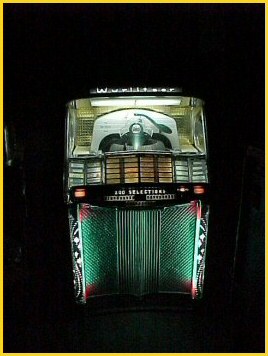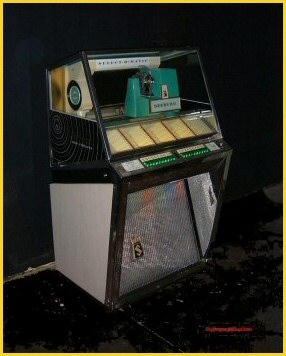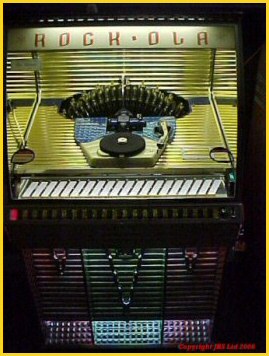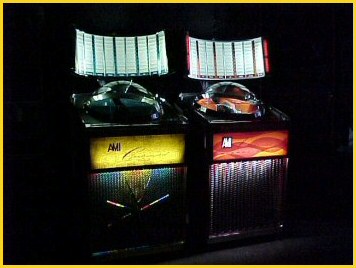Digger:
Hello Simon. How are you?
Simon:
Yes, very busy.
Digger: That's good. Can you tell us a bit about your
background and the background to the business please?
Simon: Yes. David, has a love of restoring things
mechanical and when still at school restored a combine
harvester. He then decided to try something smaller and
bought an old jukebox. He became fascinated and started
collecting old jukeboxes. When I met him in 1974, he
already had several dozen. I was into amateur stage
lighting and sound and had started to build discotheques
with another engineer and bought my first jukebox from David as a joke for Christmas. After Christmas, one of the
DJs suggested we could install it in a local college and
that's how I got into operating. David qualified as a
pilot that year and so had no involvement in the operating
business.
Digger: So you became an operator of all machines?
Simon: No, initially I operated jukeboxes in the evenings
and weekends, then Space Invaders came along and we
expanded rapidly. But it only lasted a few months, so I
made the decision to swap all my non- jukebox equipment and
concentrate on jukeboxes. So, over the next 30 years I
built up a specialist workshop and a dedicated team of
engineers and without doubt we created the best
restorations available.
Digger: Did you see much of David?
Simon: He was hardly ever around, but he continued to
collect jukeboxes around the world, initially in out-of-the-way places in
the UK, but as they dried-up North America
and then South America and Central Africa. He got carried
away a bit and at one point we could easily say that we
had the largest stock of old jukeboxes (pre-1962) in
Europe. It's probably possible to still say it because I
doubt if anybody is as foolish as us to still have as many
as we've got! We've got a 4,000 sq ft store which we are
now slowly clearing out. At one time it was so full, if
you wanted to get to the back you had to body surf across
the top!
Digger: Packed together like they do in car showrooms?
Simon: Closer. Now we are clearing these jukeboxes out and
we are putting spares on our website. There's a lot of
bits and only David knows what he bought.
Digger: I think just by their nature jukeboxes are
glamorous to people. The look of them, the sound, the
lights, the moving parts and they are evocative of a time
past.
Simon: Good engineering is a real joy. The machines that
built the channel tunnel or the shuttle are just as
beautiful, its just that you can't really collect them in
your living room. At the peak, in perhaps 1956, the jukebox
industry was the world catalyst in electronics, just the
same as mobile phones, PCs and games machines over the
last 20 years. I came into it as an engineer and to me
it's a piece of kit that I work on. David is the lover of
jukeboxes.
Digger:
What happened to the restoration business?
Simon:
Well, as the pubs started to close, turn into restaurants
or blocks of flats and even Tesco, jukebox operating
started to die and then it all turned into computers and
MP3s. So there was no point in having a staff of
mechanical engineers to support the jukeboxes in the pubs.
I tried to run the business just doing restorations, but
it made a loss. The last mobile engineer we had has set-up
on his own.
Digger:
What's his name?
Simon: Paul Thornley, he serviced the pubs we supplied in
the Midlands for us for three years then did a couple of
years working on cruise liners.
Digger: Cruise liners?
Simon: They employ fruit machine engineers, but once the
ship is at sea they end up mending anything the Captain
asks them to do, so they become very competent engineers.
He really enjoyed it and they had him repairing cigarette
machines and coffee machines, you name it! The captain
rang him and said "The washing machine's gone
wrong." Or the roulette wheel or the tills. He's a
lovely guy and is doing very well.
Digger: I didn't know they did that.

Simon: It's good money and a lovely life and they get to
see the world. Paul did several trips on the cruise ships,
before coming to London to service vintage jukeboxes for
us.
Digger: People seem to love Retro and Nostalgia. Why do
you think that is?
Simon: Well, people like good food, a nice view, a
beautiful painting, they all conjure up thoughts and
feelings, the Oxo Building a Singer Sewing machine or a
red telephone box.
Digger: And jukeboxes?
Simon: In their day, the jukeboxes were at the forefront
of design. There are some really exceptional jukeboxes -
the Seeburg V200 or the Rock-Ola 1475 or the AMI
Continental all designed within a few years. As far as
amazing design is concerned, get a chance to see a Chantal Meteor or
Seeburg Trashcan.
Digger: Aren't there people who were growing up in the
seventies and eighties who wouldn't have a clue about the
vintage jukeboxes? They would prefer the sorts of machines
you were putting into pubs in the seventies and eighties,
wouldn't they?
Simon: Have you seen an NSM Prestige ES160-2 or City 2?
They were made in the 1980's but hit all the right spots,
style, size, reliability and best of all they are wood and
plastic...brilliant, real design icons.
Digger: I suppose that everybody gets some sort of
exposure to the 1950s classic jukeboxes because of cinema
and TV.
Simon: Yes. We get waves of interest encouraged by things
like the movie 'Ghost' which everyone quotes. That movie
had an AMI Continental in it. Also 'Happy Days' where the
title sequence actually features three jukeboxes, so when
people say they'd like a jukebox like the one in Happy
Days it's actually a long shot of one jukebox and the
working parts of a completely different jukebox. Did
you ever see the penultimate TV programme 'The Prisoner' or
Cheers? We have supplied quite a few jukeboxes for film
and TV over the years and even had a horror film made in
our warehouse.
Digger: My favourite is the one where the turntable
platter comes up to the disc rather than the record being
selected and brought down to the turntable. It looks
like it shouldn't work, but it does!
Simon:
The 78 players used to work like that. Rockola and
Wurlitzer managed to infringe each others' patents in a big
way.
Digger: What advice would you give to somebody thinking
about buying a jukebox?
Simon: Always see the jukebox working and always make sure
the owner of the jukebox is not standing close enough to
the jukebox so he can fiddle with the jukebox while it's
supposed to be working.
Digger: That comes from experience.
Simon: That always has been a common one – people say to
me "I bought a jukebox and it was working fine and
took it home and it didn't work." And the answer is
"How did the guy make it work?" And eventually
you establish that he did that by pushing and poking at
the right moments. I can make a jukebox supposedly work
without even touching it.
Digger:
The old Fonzie thing!
Simon: But the real proof is it should work from a
standing start.
Digger: Ah!
Simon: If the jukebox is sitting in front of you, you
should be able to walk up to it and select A9 or whatever
record you want, play it and then the jukebox should be
able to 'park' all on its own. And if it doesn't do all
that on its own then there is something wrong with it.
Digger: You're not doing repairs these days?
Simon: I like to keep my hand in on NSM, but mostly we are
clearing out our stock. The stock that we've got is very
specialist stuff which is mostly going into the trade. So
we are supplying things from our stock to restorers. I
still say on the website we have the biggest stock in
Europe and that is probably still the case although I
don't know if other jukebox dealers are hanging on to
stock waiting for rising prices. We are slowly either
selling them as complete non-workers or we are selling
them as parts.
Digger: What are the best sellers Simon?

Simon: The Wurlitzers, which have all gone. People go for
the name - in engineering terms they are definitely not the
best, now it's either Rock-Ola or AMI. It's Wurlitzer
first, Rock-Ola and AMI next and Seeburg next which is, in
fact, the reverse of how it goes in America where I
understand that Seeburg is the most popular. Seeburg are
the best-engineered - apparently they had a head start on
the others as their factory was used for manufacturing
electronic equipment during the war, so they had a ready
supply of technical engineers.
Digger: Are you getting enquiries from all over the world?
Simon: Yes, we are although packing and shipping is
difficult – the value of the pound helps in Europe now,
it was against me for over ten years.
Digger:
What about customer comments and feedback?
Simon: The stuff that we sell goes out to the specialist
trade so collectors of old jukeboxes and restorers will
come in and buy maybe one every few months off of us and
restore them and sell them on. So, it's a specialist
source of old jukeboxes for those that have got the time.
It's a nice little retirement project for somebody. If
someone who's been in engineering all their life and retires and has
maybe £1,000 to spend which could potentially convert
into £4,000-£5,000, then we have that sort of stock
available. They've got to be skilled, so that is the main
side of our business that really needs pushing.
Digger: What are the best aspects of running the business?
Simon: The fact that when I've sold the final jukebox I
can retire. (Both laugh)
Digger: What's the plan for the future then – to go to
the Algarve?
Simon: There's a long line of jukeboxes and it will take a
long time to sell them all.
Digger: I used to have a mate who was a mini-cab driver
and he was building a house in the West Indies. Every mile
he drove he would say was another brick for the house. But
he got there.
Simon: Oh really? Very good.
Digger: He ended-up taking a boat around the islands for
the tourists. Do you plan to stop?
Simon: I did engineering at Kingston Poly and worked for a
good old British company then did a couple of years
working for an American one, before the Space Invaders
came along. I'm not sure I was ready to run my own
business, so it took a long time to earn much, but the 90's
were very good. I've stayed in contact with several
friends from college and quite a few have risen to quite
senior jobs and done very well. I'm not sure any of us
need to pay brick by brick for our retirement homes. I'm
lucky though now because I don't have to officially
retire, I plan on just working a bit less each year.
Digger: Oh, good for you. That's great.
Simon: Yeah, it's possible. So the answer to your question
is that the end-game for us is, not so much myself but
David my partner - he is the collector of old jukeboxes
and he loves them. But as mechanical objects and likes the
challenge of getting a dirty broken one and cleaning it up
and making it work. So he's got a stock of what must be
approaching 300 now. The mix was Wurlitzer, Rockola, AMI
and Seeburg – he loves these jukeboxes. And he is an
airline pilot but as he gets older and as the airline
business is in a bit of the doldrums he's got more and
more time to be doing these things up. I specialised in
NSM, which is the much newer entry, and is a post–war
product. I had an engineer who was working for me who was
absolutely brilliant about 20 years ago and NSM approached
us and said "Would we like to work for them?"
And we first started servicing them and became a
distributor and distributed for the best part of 20 years.
That finished when CD jukeboxes finished, which is eight
years or so ago now. I now still do NSM so as an engineer
I'm doing NSM jukeboxes for customers and I can continue
to do those until my spares run out. And I've got a big
box of spares. In fact, I manufacture some bits to keep
these machines going. So there's the two sides of the
business, me and then David with the large stock of
jukeboxes he's bought over the last thirty years. He's
turning them out either on eBay or through the website.
We're working on building up our website so people can see
what we've got, although that takes time and selling
jukeboxes makes money. There's a great tendency to spend
more time on selling them than growing a decent website.
Digger: The website is often the poor relation but it is
your shop window to the world. It's something you need to
keep up-to-date.
Simon: When we started it was a actually a very good
website because nobody else had one at all but as time has
gone on several people have chucked a few thousand quid at
theirs and had commercial websites built with bells and
whistles. But their product is basically a different
product, because most of them are simply buying jukeboxes
up and selling them on again whereas we've got a raw stock
of raw jukeboxes. So the big interest to anybody in the
world at large is they're looking for the perfect jukebox
as a project.
Digger: What are David's Retro passions?
Simon: Definitely the AMI Continentals and the Rockola
Tempos and Tempo II's. The 1475s, the V200s. In theory
David can find more because he's an airline pilot so he
knows where in the world they are. He's got a lot to sell
first and at the rate he's selling them it's going to take
many, many years to do. People should come in and see what
David's got.
Digger: Is it always advisable to see them 'in the flesh'
as it were?
Simon: Yes, always send David an email first and then
he'll send you some photographs and you can check that
it's what you want. Then come in and see it.
Digger: By appointment?
Simon: Yes. You need to physically climb over the stuff
and put your hands on it and work out what you've got.
It's definitely for specialists though - we're not selling
now to the public at large.
Digger: Rod Argent has a jukebox with all of his hits on
it and all the songs that inspired him. It's great.
Simon: Yes, he has had his jukebox repaired by us.
Digger: Any other famous clients?
Simon: Well, I like to keep these things confidential, but
one of the stars who is always having his photograph taken
next to his jukebox, of course, is Cliff Richard. Somebody
told me that he officially announced that he's not in the
UK any more and we recently moved his box to his vineyard
in Portugal. When it arrived it didn't work, so David
jumped on an aeroplane and went out and mended it. When he
played the jukebox to test it Cliff mimed along with the
record! He stands right next to you and it's a bit
unnerving with him miming along. I met Cliff at Wembley
when we were delivering a jukebox for The Hit List.
Digger: Do you attend The Brighton Jukebox Show?
Simon: No. I've generally avoided the shows more recently
– I did them when they started and I couldn't really
escape because Kempton Park is literally down the road
from me. A mile and a half from my house.
Digger: The Jukebox Madness Show isn't going any more.

Simon: No, well if that had happened a few years ago that
would have been a blessing to me because it's so close –
it was far too close for comfort! So I took jukeboxes, I
couldn't ignore it although it was never a commercial
success for me.
Digger: So there's only the Brighton Jukebox Show now.
Simon: Yes. I went to Copthorne a couple of times but never
exhibited there.
Digger: Is there much competition for spares?
Simon: We've got a lot of spare parts and original parts.
There's Leon who's selling a lot of spare parts and what
he's selling is stuff that's coming out of garages of
operators who are packing up now – guys in their late
sixties who want to sell up. He goes down with a lorry and
clears them out, so it's all Rockola 470 and 469 and AMI
Cadets and things like that. That's all too new for us -
the stuff that we've got is from 1955 – 1962 and we've
got a lot of it.
Digger: A very small window actually.
Simon: Yeah. But the best. They changed in 1962 and that
was the definite watershed because AMI were sold to Rowe
at that point and they seemed to go for smaller jukeboxes
and everybody else seemed to follow suit. I'm not sure who
led and who followed.
Digger: I was talking to Mark, who runs the Ace Café, and
he said people come to visit who would have been there in
the fifties or sixties and they say "That's not the
right jukebox. not the one I remember being
there." And Mark points out that the jukebox would
have been changed every once in a while
Simon: One of our older engineers used to maintain the
jukebox at the Ace Café. He tells me that when he worked
there it was plated in steel – all the corners, so
basically it was a jukebox in a steel box because it used
to get kicked so much. I ought to get him to write down
what he remembers because I'm sure that would be one of
the most nostalgic stories that anybody has.
Digger: I wonder if you could get hold of that jukebox it
could command a big price because of all the groups that
passed through the café and would have used it. A bit
like that urinal in the New York club that sold for
several thousand dollars just on the fact that numerous
rock celebrities were bound to have used it.
Simon: I mentioned I went to Kingston Poly and I didn't
know why at the time and it never really dawned on me at
the time as being strange. But we used to have a band
playing every Saturday night and I've actually spent a
little time researching and should research it more - and
I hadn't realised that the reason was because the Eel Pie
Island had just burned down. We had Status Quo, Thin
Lizzy, ELO, lots of others too. This was '70/'72 and I
believe the Eel Pie Island went in '69/'70. I used to turn
up on a Saturday night, turn the lights on and get them
working and it meant nothing to me. I remember The Crazy
World of Arthur Brown came and they created a big stink
because they needed their own electricity supply. And
every Wednesday I used to go over to the Art College
annex, because they had a folk club, and the regular
players there was Peggy Seeger and Ewan MacColl. I didn't
realise that they were famous. Kirsty and the other
children used to appear with him on stage when they were
young. I used to do the lighting on my own – I don't
remember anything about the shows at all! Even today I'm
still an engineer and much more interested in the
technical side of it.
Digger:
Thanks Simon for your experiences and for letting us know
about these great vintage machines.
Simon: Thanks David. Bye

